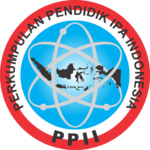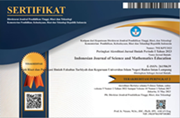DicMath application with songs: A solution for overcoming misconceptions in mathematics story problems in elementary schools
Abstract
Keywords
Full Text:
PDFReferences
R. Rosita, A. Z. Sulaiman, J. Jumrah, and A. K. Ahmad, “Penguatan Pondasi Matematika dan Sains Anak Pendidikan Dasar,” Jurnal Pengabdian Masyarakat Disiplin Ilmu (JPMASDI), vol. 1, no. 2, pp. 1–7, 2023, doi: 10.62017/jpmi.v1i2
G. M. Segarino, J. Labisig, L. Calmerin, and C. Cabello, “SIMS as Intervention in Enriching the Teaching of Fundamental Operations in Mathematics: An Action Research,” Psychology and Education: A Multidisciplinary Journal, vol. 5, no. 1, pp. 11–20, 2022, doi: 10.5281/zenodo.7162173.
J. Just and H.-S. Siller, “The role of mathematics in STEM secondary classrooms: A systematic literature review,” Educ Sci (Basel), vol. 12, no. 9, p. 629, 2022, doi: 10.3390/educsci12090629.
T. N. Kuntadi and F. D. Hidayat, “Training Children’s Character Education Through Technology-based Learning Media,” International Journal of Education, Language, Literature, Arts, Culture, and Social Humanities, vol. 1, no. 1, pp. 35–44, 2023, doi: 10.59024/ijellacush.v1i1.25.
A. H. Pulungan, “The use of interactive learning media for teachers in rural areas,” Budapest International Research and Critics in Linguistics and Education (BirLE) Journal, vol. 4, no. 1, pp. 524–532, 2021, doi: 10.33258/birle.v4i1.1705.
A. Wibowo, A. Rahman, M. Ishaq, A. Yus, and A. Simaremare, “Analisis Efektifitas Media Pembelajaran Pkn Terhadap Gaya Belajar Kelas III SD,” Journal of Educational Analytics, vol. 1, no. 1, pp. 1–8, 2022, doi: 10.55927/jeda.v1i1.417.
K. Karlimah, G. Hamdu, V. Pratiwi, H. Herdiansah, and D. Kurniawan, “The development of motion comic storyboard based on digital literacy and elementary school mathematics ability in the new normal era during covid-19 pandemic,” in Journal of Physics: Conference Series, IOP Publishing, 2021, p. 012026, doi: 10.17509/pedadidaktika.v8i3.39232.
R. Rachmadtullah, B. Setiawan, A. J. A. Wasesa, and J. W. Wicaksono, “Elementary school teachers’ perceptions of the potential of metaverse technology as a transformation of interactive learning media in Indonesia,” International Journal of Innovative Research and Scientific Studies, vol. 6, no. 1, pp. 128–136, 2023, doi: 10.53894/ijirss.v6i1.1119.
M. R. A. Haryana, S. Warsono, D. Achjari, and E. Nahartyo, “Virtual reality learning media with innovative learning materials to enhance individual learning outcomes based on cognitive load theory,” The International Journal of Management Education, vol. 20, no. 3, p. 100657, 2022, doi: 10.1016/j.ijme.2022.100657.
Kemendikbud Ristek, “Keputusan Kepala Badan Standar, Kurikulum dan Asesmen Pendidikan Kementerian Pendidikan, Kebudayaan, Riset, dan Teknologi Nomor 033 Tahun 2022.,” 2022.
A. F. Rizqi, B. L. Adilla, and E. Sulistiyawati, “Analisis kesulitan belajar matematika pada siswa sekolah dasar dan alternatif pemecahannya,” Jurnal Pendidikan Dasar Flobamorata, vol. 4, no. 1, pp. 481–488, 2023, doi: 10.51494/jpdf.v4i1.588.
A. Patel, S. Bhattamishra, and N. Goyal, “Are NLP models really able to solve simple math word problems?,” arXiv preprint arXiv:2103.07191, 2021, doi: 10.18653/v1/2021.naacl-main.168.
S.-Y. Miao, C.-C. Liang, and K.-Y. Su, “A diverse corpus for evaluating and developing English math word problem solvers,” arXiv preprint arXiv:2106.15772, 2021, doi: 10.18653/v1/2020.acl-main.92.
M. Öztürk, Y. Akkan, and A. Kaplan, “Reading comprehension, Mathematics self-efficacy perception, and Mathematics attitude as correlates of students’ non-routine Mathematics problem-solving skills in Turkey,” Int J Math Educ Sci Technol, vol. 51, no. 7, pp. 1042–1058, 2020, doi: 10.1080/0020739x.2019.1648893.
L. Heliawati, L. Lidiawati, and I. D. Pursitasari, “Articulate Storyline 3 multimedia based on gamification to improve critical thinking skills and self-regulated learning,” International Journal of Evaluation and Research in Education, vol. 11, no. 3, pp. 1435–1444, 2022, doi: 10.11591/ijere.v11i3.22168.
F. Daryanes, D. Darmadi, K. Fikri, I. Sayuti, M. A. Rusandi, and D. D. B. Situmorang, “The development of articulate storyline interactive learning media based on case methods to train student’s problem-solving ability,” Heliyon, vol. 9, no. 4, 2023, doi: 10.1016/j.heliyon.2023.e15082.
D. Lestarani, A. C. Lalang, and I. Manggi, “Development of Articulate Storyline 3-Based Digital Teaching Materials on the Subject of Atomic Structure and Periodic Elements System for SMA/MA Students in Class X,” Orbital: The Electronic Journal of Chemistry, pp. 127–132, 2023, doi: 10.17807/orbital.v15i2.17959.
A. S. Bella, R. Respati, and K. Karlimah, “Pengaruh Penggunaan Media Lagu Anak Terhadap Perkembangan Kognitif Siswa Sekolah Dasar,” PEDADIDAKTIKA: Jurnal Ilmiah Pendidikan Guru Sekolah Dasar, vol. 8, no. 3, pp. 632–641, 2021, doi: 10.17509/pedadidaktika.v8i3.39232.
T. Kumar, S. Akhter, M. M. Yunus, and A. Shamsy, “Use of music and songs as pedagogical tools in teaching english as foreign language contexts,” Educ Res Int, vol. 2022, no. 1, p. 3384067, 2022, doi: 10.1155/2022/3384067.
A. W. K. Putri and K. Rustipa, “Using songs to teach English vocabulary to young learners in kindergarten,” Edunesia: Jurnal Ilmiah Pendidikan, vol. 4, no. 3, pp. 1017–1030, 2023.
A. Rahmadani, A. Ariyanto, N. N. S. Rohmah, Y. M. Hidayati, and A. Desstya, “Model Problem Based Learning Berbasis Media Permainan Monopoli Dalam Meningkatkan Pemahaman Siswa Sekolah Dasar,” Jurnal Ilmiah Pendidikan Citra Bakti, vol. 10, no. 1, pp. 127–141, 2023, doi: 10.38048/jipcb.v10i1.1415.
N. Rahmah and I. Fitria, “Penerapan problem based learning (pbl) berbasis diskusi untuk meningkatkan hasil belajar peserta didik SMK negeri alu kab polewali mandar sulawesi barat,” Jurnal Pemikiran Dan Pengembangan Pembelajaran, vol. 4, no. 2, pp. 203–212, 2022.
Y. I. Sari, D. H. Utomo, and I. K. Astina, “The Effect of Problem Based Learning on Problem Solving and Scientific Writing Skills.,” International Journal of Instruction, vol. 14, no. 2, pp. 11–26, 2021, doi: 10.29333/iji.2021.1422a.
M. F. Hamdani and N. Priatna, “Pengembangan media pembelajaran matematika berbasis android untuk siswa SMP/MTs dan SMA/MA,” JURING (Journal for Research in Mathematics Learning), vol. 4, no. 2, pp. 163–170, 2021, doi: 10.24014/juring.v4i2.12795.
A. D. A. Nissa, M. Toyib, S. Sutarni, E. Akip, S. Kadir, and A. Solikin, “Development of learning media using android-based articulate storyline software for teaching algebra in junior high school,” in Journal of Physics: Conference Series, IOP Publishing, 2021, doi: 10.1088/1742-6596/1720/1/012011.
A. A. Malik, “The implementation of singing method to increase student interest in learning at TK Negeri Pembina Lebong,” SISTEMA: Jurnal pendidikan, vol. 2, no. 1, pp. 66–73, 2021, doi: 10.24903/sjp.v2i1.720.
N. Imama, S. Utaminingsih, and A. H. Madjdi, “The effectiveness of the development of problem based learning model based on Bakiak game technology in mathematics learning in elementary schools,” in Journal of Physics: Conference Series, IOP Publishing, 2021, doi: 10.1088/1742-6596/1823/1/012079.
Sugiyono, Metode Penelitian dan Pengembangan (Research and Development/R&D). Bandung: Alfabeta, 2022.
Purwanto, Metodologi Penelitian Kuantitatif. Pustaka Pelajar, 2017.
K. E. , Lestari and M. R. Yudhanegara, Penelitian Pendidikan Matematika. Bandung: Refika Aditama, 2017.
M. Szczygieł and B. Pieronkiewicz, “Exploring the nature of math anxiety in young children: Intensity, prevalence, reasons,” Math Think Learn, vol. 24, no. 3, pp. 248–266, 2022, doi: 10.1080/10986065.2021.1882363.
Z. Xiuwen and A. B. Razali, “An overview of the utilization of TikTok to improve oral English communication competence among EFL undergraduate students,” Universal Journal of Educational Research, vol. 9, no. 7, pp. 1439–1451, 2021, doi: 10.13189/ujer.2021.090710.
Susanto, A. , I. Kristiana, A. Ftahillah, E. Waluyo, R. Alfarisi, and Hobri, Buku Panduan Guru Matematika untuk SD/MI Kelas III. Jakarta: Kementerian Pendidikan, Kebudayaan, Riset, dan Teknologi Republik Indonesia, 2022.
Y. A. Arofaturrohman, D. Darsinah, and W. Wafroturrohmah, “Penggunaan Media Lagu Dalam Pembelajaran Pendidikan Pancasila Dan Kewarganegaraan Yang Inovatif,” Innovative: Journal Of Social Science Research, vol. 3, no. 3, pp. 7338–7345, 2023, doi: 10.31004/innovative.v3i3.2994.
C. Chen, H. Hung, and H. Yeh, “Virtual reality in problem‐based learning contexts: Effects on the problem‐solving performance, vocabulary acquisition and motivation of English language learners,” J Comput Assist Learn, vol. 37, no. 3, pp. 851–860, 2021, doi: 10.1111/jcal.12528.
E. D. Koç and D. Öner, “An investigation of using elaborated and metacognitive feedback strategies in interactive instructional videos,” Journal of Educational Technology and Online Learning, vol. 6, no. 4, pp. 991–1008, 2023, doi: 10.31681/jetol.1339219.
A. Alfatihah, H. Husniati, and L. H. Affandi, “Analisis Kesulitan Belajar Matematika Siswa di Kelas V SDN 15 Mataram Tahun Ajaran 2021/2022,” Jurnal Ilmiah Profesi Pendidikan, vol. 7, no. 3b, pp. 1657–1664, 2022, doi: 10.17509/pedadidaktika.v8i3.39232.
K. Kounlaxay, Y. Shim, S.-J. Kang, H.-Y. Kwak, and S. K. Kim, “Learning media on mathematical education based on augmented reality,” KSII Transactions on Internet and Information Systems (TIIS), vol. 15, no. 3, pp. 1015–1029, 2021, doi: 10.3837/tiis.2021.03.011.
A. Arvyaty, H. Hasnawaty, and M. F. Ibrahim, “Pengembangan media pembelajaran Articulate Storyline untuk pemahaman konsep materi turunan,” Jurnal Riset Pendidikan Matematika, vol. 10, no. 2, pp. 139–152, 2023, doi: 10.21831/jrpm.v10i2.71066.
L. D. Agustin and N. Shofiyah, “Pengaruh Penerapan Model Problem Based Learning (PBL) dalam Mereduksi Miskonsepsi Siswa pada Pembelajaran IPA Kelas IV Sekolah Dasar,” Emergent: Journal of Educational Discoveries and Lifelong Learning (EJEDL), vol.2, no.1, p.13, 2023, doi: 10.47134/emergent.v2i1.28.
DOI: http://dx.doi.org/10.24042/ijsme.v8i1.26291
Refbacks
- There are currently no refbacks.
Copyright (c) 2025 Unit Riset dan Publikasi Ilmiah Fakultas Tarbiyah dan Keguruan Universitas Islam Negeri Raden Intan Lampung

This work is licensed under a Creative Commons Attribution-ShareAlike 4.0 International License.

Indonesian Journal of Science and Mathematics Education is licensed under a Creative Commons Attribution-ShareAlike 4.0 International License.




